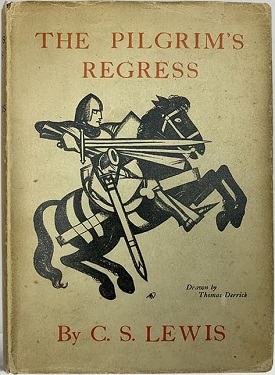The Pilgrim's Regress

First edition (UK)
|
|
| Author | C. S. Lewis |
|---|---|
| Country | United Kingdom |
| Language | English |
| Genre | Fantasy novel |
| Publisher |
J.M. Dent and Sons (UK) |
|
Publication date
|
1933 (UK) 1935 (US) |
| Media type | Print (Hardback & Paperback) |
J.M. Dent and Sons (UK)
Sheed and Ward (US)
The Pilgrim's Regress is a book of allegorical fiction by C. S. Lewis. This 1933 novel was Lewis's first published work of prose fiction, and his third piece of work to be published. It charts the progress of a fictional character named John through a philosophical landscape in search of the Island of his desire. Lewis described the novel to his publisher as "a kind of Bunyan up to date," in reference to John Bunyan's 17th century novel The Pilgrim's Progress, recast with the politics, ideologies, philosophy, and aesthetic principles of the early 20th century. As such, the character struggles with the modern phoniness, hypocrisy, and intellectual vacancy of the Christian church, Communism, Fascism, and various philosophical and artistic movements.
John the pilgrim journeys, in a manner like Christian in Pilgrim's Progress, in search of the Island of his desire, for which his longing is never quite forgotten even though he has received but a glimpse of it. Like the Pilgrim in Bunyan's allegory, John meets a fellow traveller, in this case called Vertue, and the two journey together.
The land through which John travels is composed of shires with such names as Puritania (where he starts), Zeitgeistheim, Dialectica, Pagus. He also meets figures with names such as Mr. Enlightenment, Mr Sensible, Drudge, Mr Neo-Classical, Mr Humanist, Neo-Angular, and Mother Kirk.
The characters do not correspond to any in Bunyan's Pilgrim's Progress, but Lewis uses the same literary model as Bunyan.
The novel, though allegorical, deals for the most part with moral philosophy, and describes the quarrel in John's soul between The Rules (John's earlier instruction by the Steward) and The Pictures (his imagination and the Island), and his search to reconcile these. On his journey, he must eschew the false philosophical trails and the imitations of Sweet Desire.
Lewis' character finds that many philosophical roads ultimately lead to a fascistic nihilism, his explanation of the flourishing Nazi movement and other socialist governments of World War II. This also highlights his own attraction to paganism and Norse mythology as his first spiritual awakening that led him to Christianity (as detailed in Surprised by Joy), while acknowledging the darker potential elements of paganism as well.
...
Wikipedia
